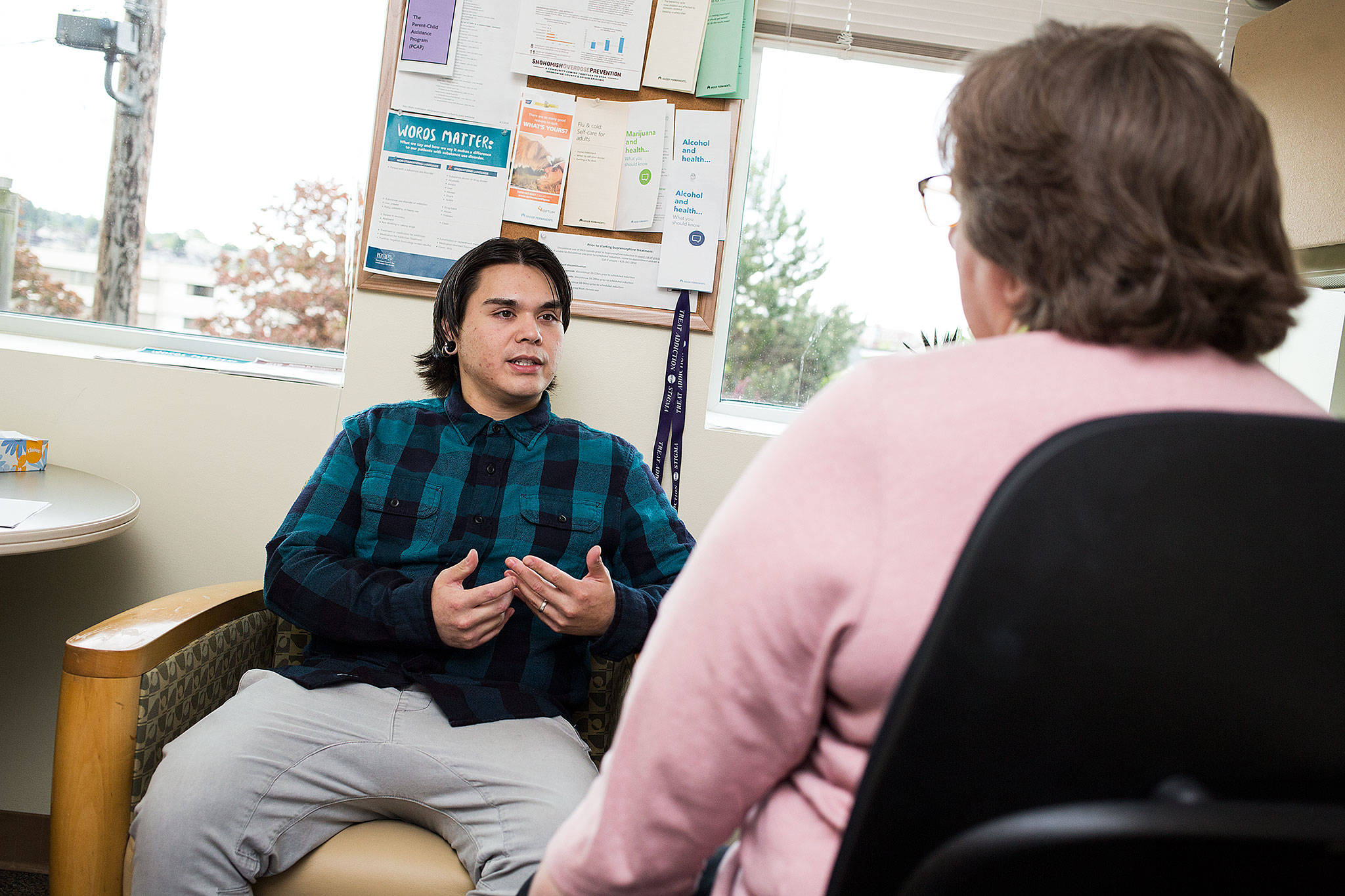John Haws said he began smoking heroin at 14. Three years later he was shooting up.
“I knew I had no control,” he said.
Eventually, an infection from his drug use traveled to his brain and damaged his heart valves.
A stern warning from his surgeon — that if he resumed his drug use and his heart valves were damaged again, there would be no way to repair them — started him on the path to recovery.
Haws, now 23 and living in Tulalip, celebrated his one-year anniversary of being clean last month.
He said he previously had tried in-patient treatment programs, but they didn’t work. He felt like he was being forced to not use drugs.
Then he tried something different: Kaiser Permanente’s in-office addiction treatment service in Everett, launched about a year ago.
“Now, the program I’m doing is because I want to not use,” he said.
A nurse serves as a kind of treatment “quarterback,” helping ensure patients get medical and counseling services to help reduce or stop their opiate abuse.
The goal is for people to get help fast, said Eileen Krembs, the nurse care manager for the program in Everett.
Those seeking treatment are told that they likely will need to remain on medications to reduce drug cravings, such as suboxone, for six months to a year.
“It takes time for our bodies to heal” and to build up support systems so that they can make a choice not to use opioids, she said. “Treating a chronic disease is more than just stopping the use of the drug.”
Patients are free to start — and stop — at will. If they do stop for a while, they are welcome to come back and keep trying, Krembs said.
Patients 18 to 70 years old have signed up for the service. Not all are using opiates from the street. Some are struggling with chronic pain, Krembs said.
In-office treatment is not new. Many programs are overseen by a physician who can refer patients to other medical staff for related treatments.
The Everett program, now with 25 patients, is modeled after treatment developed at Boston Medical Center.
Everett is the only site in Kaiser’s health care system in Washington offering the nurse-based treatment, which is open to Kaiser and Molina Healthcare patients.
The need for local treatment programs was underscored by a Snohomish Health District study earlier this year, estimating that opiate addiction affects as many as 10,000 people.
Hospitals in Everett and Edmonds treated 585 people for overdoses in the 15-month period ending on March 31, according to preliminary data, which also showed that 118 people died from opiate abuse last year.
“We knew Snohomish County had a huge burden,” said Dr. Ryan Caldeiro, Kaiser’s chief of addiction and recovery services.
Patients often are prescribed suboxone, an opiate medication that acts differently in the body than when opiates are misused. It eliminates cravings, helps stabilize the nervous system, “and they’re not high,” Caldeiro said.
The treatment — guided by a nurse and with prescribed medication — generally is more effective than abstinence-based therapy, he said.
“It’s a highly stigmatized disease,” Caldeiro said. “Part of what we’re doing is trying to destigmatize the condition and make it easier for people to get treatment.”
In-office treatment means people don’t have to take three to four weeks off work as is common with in-patient treatment, Caldeiro said. “They can start treatment and get significantly better without losing a day of work or not being able to care for their family — that’s huge,” he said.
Haws said his recovery also was aided by a recommendation to join 12-step meetings, where he could talk to others who also faced and recovered from similar addiction problems. A phone app shows when and where meetings are scheduled.
“Everything just kind of fell into place when I started getting into recovery and putting my own work into it instead of other people telling me what I needed to do,” he said.
“All my plans never came through because of my problem. Now all those things are coming back.”
He said he would like to get a job in construction, welding or working on ships.
Haws said he doesn’t think he would have progressed so far without the 12-step meetings and Kaiser treatment program.
“It’s always a good experience. I’m happy to go there,” he said of the in-office service. “I’m seeing the possibilities now. I’m getting the right help.”
Sharon Salyer: 425-339-3486 or salyer@heraldnet.com.
How to get help
Patients are referred to Kaiser Permanente’s in-office addiction treatment program through their health care provider. Call member services at 888-901-4636 for information.
Talk to us
> Give us your news tips.
> Send us a letter to the editor.
> More Herald contact information.

























